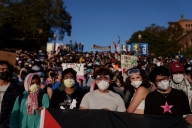You have /5 articles left.
Sign up for a free account or log in.
Middle East studies scholars are criticizing a decision by George Washington University to cooperate with The New York Times to create a public online archive of the “ISIS files,” internal Islamic State documents that were removed from Iraq by the newspaper and became the subject of the investigative article "The ISIS Files." The Middle East Studies Association’s Committee on Academic Freedom previously criticized the newspaper's decision to remove and publicize the documents, arguing in a letter in May that the Times had no right to remove the documents and that the publication of documents containing personal information risked endangering the safety of individual Iraqis.
MESA’s Committee on Academic Freedom wrote in a Sept. 25 letter to George Washington that its involvement with the archiving project implicates the university in many of the moral, ethical and professional issues it believed to be at stake in the newspaper's decision to remove and publicize the documents. The letter urged George Washington to at least restrict the documents to use by professional researchers who abide by institutional review board regulations.
George Washington University referred questions to its Sept. 10 press release and a statement from its Program on Extremism, which embarked on the partnership with the Times to digitize and translate the documents and publish them on an open website.
"The public repository will allow researchers around the world -- including those in Syria and Iraq -- to access a wide array of documents that provide invaluable evidence on the activities and atrocities carried out by the Islamic State group," the Sept. 10 press release said. "The documents, most of which are written in Arabic, will be posted in their original form after GW conducts a thorough analysis of the documents to help ensure information that could harm civilians will not be published, as The Times did when it published many of these documents in its original reporting. The Times delivered the original documents to the Iraqi government through its embassy in Washington after the files were digitized."
In May, the Times published a Q&A with its international editor, Michael Slackman, and the reporter who wrote "The ISIS Files," Rukmini Callimachi, about the ethical and legal considerations involved in collecting and reporting on the documents. Slackman and Callimachi said that the Times team received the permission and help of Iraqi security officials to collect and preserve the documents, which had been left to the elements or in some cases were being burned. In response to a question about the journalistic value of not redacting the names of normal Iraqis, Callimachi wrote, “Please know that we would of course remove identifying information if we believed there was a risk to a civilian’s safety.”








